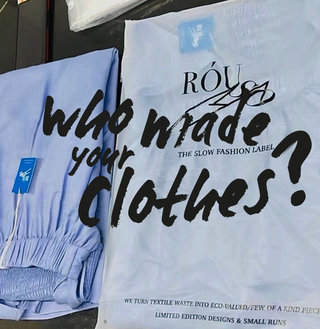
In a world where fast fashion reigns supreme, the concept of slowing down and embracing the principles of the slow fashion movement has gained traction. By making conscious choices in what we wear and how we shop, we can significantly impact the fashion industry's environmental footprint and labor practices. The shift towards sustainable and ethical fashion is not only a personal choice but a step towards a more responsible and mindful approach to our clothing consumption. But how exactly can individuals navigate this transition and contribute to a more sustainable future in fashion?

Understanding Slow Fashion Movement
Within the realm of sustainable fashion practices, the Slow Fashion Movement stands as a global initiative aimed at mitigating the negative impacts of fast fashion. Originating from the broader sustainability discourse, slow fashion prioritizes thoughtful production, quality, and environmental responsibility. This movement encourages consumers to shift away from the fast-paced, trend-driven consumption patterns promoted by fast fashion brands. Instead, it advocates for investing in durable, timeless pieces that are ethically produced and environmentally friendly.
Major markets in Europe, North America, and Asia are witnessing a notable transition towards sustainable fashion practices as both brands and consumers recognize the urgency of reducing the fashion industry's environmental footprint. Leading the charge are pioneering brands that are setting new standards for ethical production and consumption, reshaping the industry's landscape. By embracing slow fashion principles, individuals can contribute to a more sustainable and ethical fashion ecosystem, supporting brands that champion recycled materials, natural fibers, and timeless designs.
Impact of Fast Fashion Industry
The fast fashion industry's rapid production cycles and emphasis on disposable clothing have led to significant environmental and social consequences. With the pressure to constantly churn out new trends at low prices, fast fashion brands often resort to exploitative labor practices, contributing to poor working conditions and low wages in garment factories.
This relentless pursuit of quick turnaround times also results in massive amounts of textile waste and pollution, as cheaply made garments are discarded after only a few uses, ending up in landfills or incinerators.
Moreover, the fast fashion model heavily relies on the use of synthetic materials and harmful chemicals, further exacerbating its environmental impact by contributing to water pollution and greenhouse gas emissions. The industry's focus on mass production and consumption fuels a cycle of overconsumption, encouraging a throwaway culture that prioritizes quantity over quality.
As consumers become more aware of these issues, there is a growing demand for sustainable alternatives that prioritize ethical production practices and environmental stewardship.
In addition to the environmental and social costs, the fast fashion industry also has potential economic consequences. The industry's reliance on cheap labor often means that it contributes to the perpetuation of poverty in developing countries. Furthermore, the rapid turnover of trends can lead to economic instability for retailers who must constantly adapt to changing demands. The focus on quantity over quality also means that consumers often end up spending more in the long run, as cheaply made clothing needs to be replaced more frequently. However, the increasing consumer demand for sustainable and ethical clothing presents an opportunity for change. By shifting to a more sustainable model, brands can not only reduce their negative impacts but also appeal to a growing market of conscious consumers.
Importance of Sustainable Practices
Sustainable practices in the fashion industry play a crucial role in mitigating environmental impact and promoting ethical production standards. By implementing sustainability initiatives, fashion brands can reduce their carbon footprint, minimize waste generation, and support fair labor practices throughout the supply chain.
Embracing sustainable practices involves using eco-friendly materials, such as organic cotton, recycled polyester, and biodegradable fibers, to create clothing with a lower environmental impact. Additionally, adopting ethical production standards ensures that garment workers are treated fairly, paid a living wage, and provided with safe working conditions.
Consumers are increasingly recognizing the importance of sustainable fashion, driving demand for transparent and eco-conscious brands. Supporting sustainable practices in the fashion industry not only benefits the environment but also contributes to the well-being of communities and workers involved in the production process.
Key Principles of Slow Fashion
A fundamental aspect of the slow fashion movement is the emphasis on mindful consumption and longevity in clothing choices. Slow fashion encourages individuals to make informed decisions about their purchases, focusing on quality over quantity. This principle promotes the idea of investing in well-made garments that are designed to last, rather than chasing fleeting trends that quickly go out of style.
By prioritizing durability and timeless designs, slow fashion aims to reduce the overall environmental impact of the fashion industry and minimize the amount of textile waste generated.
Another key principle of slow fashion is promoting transparency and ethical production practices. This involves supporting brands that prioritize fair wages, safe working conditions, and sustainable sourcing methods. By choosing to purchase from companies that value ethical standards, consumers contribute to a more equitable and sustainable fashion industry.
Supporting Ethical Fashion Brands

Advocating for ethical practices in the fashion industry involves actively supporting brands that prioritize transparency and fair labor standards. By choosing to invest in ethical fashion brands, consumers play a crucial role in promoting sustainable and responsible practices within the industry.
These brands often prioritize the use of eco-friendly materials, ethical production processes, and fair wages for workers, ensuring that every aspect of the supply chain upholds high ethical standards.
Supporting ethical fashion brands not only helps in reducing the negative impacts of fast fashion but also contributes to creating a more ethical and sustainable fashion ecosystem. Consumers can look for certifications like Fair Trade or certifications indicating the use of organic materials to ensure that the brands they support align with their ethical values.
In conclusion, embracing the slow fashion movement is crucial in addressing the negative impacts of fast fashion on the environment and society.
By prioritizing quality over quantity, supporting sustainable practices, and advocating for ethical fashion brands, individuals can contribute to a more responsible and sustainable approach to fashion consumption.
It is essential to shift towards mindful consumption and make conscious choices to promote a more sustainable future for the fashion industry.


